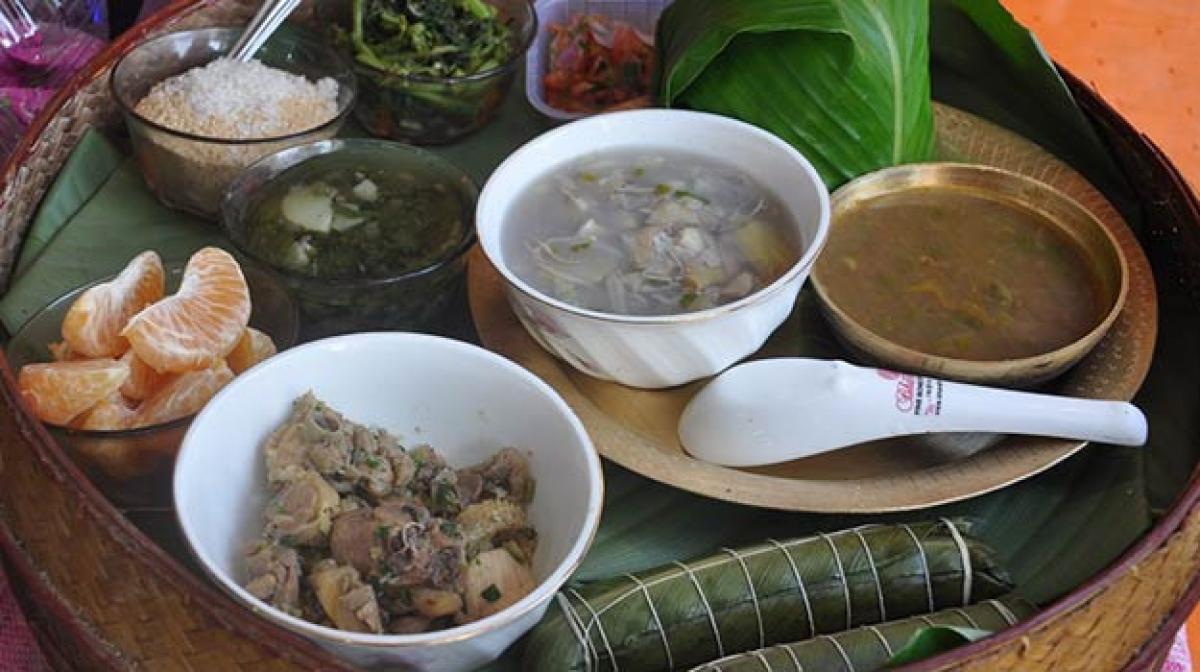Live
- Over 7,600 Syrians return from Turkiye in five days after Assad's downfall: minister
- Delhi BJP leaders stay overnight in 1,194 slum clusters
- Keerthy Suresh and Anthony Thattil Tie the Knot in a Christian Ceremony
- AAP, BJP making false promises to slum dwellers for votes: Delhi Congress
- 'Vere Level Office' Review: A Refreshing Take on Corporate Life with Humor and Heart
- Libya's oil company declares force majeure at key refinery following clashes
- Illegal Rohingyas: BJP seeks Assembly session to implement NRC in Delhi
- Philippines orders full evacuation amid possible volcanic re-eruption
- Government Prioritizes Welfare of the Poor, says Dola Sri Bala Veeranjaneyaswamy
- Two Russian oil tankers with 29 on board damaged due to bad weather
Just In

The hot, steamed meat or vegetable dumplings momos, which are said to have originated in Nepal, were the star dish at the Rongali - Destination, Culture, Harmony, a festival of Assam which aims to highlight, among other things, ethnic delicacies of the northeast region. Chinese cuisine too was lapped up by the festival visitors.
The hot, steamed meat or vegetable dumplings momos, which are said to have originated in Nepal, were the star dish at the Rongali - Destination, Culture, Harmony, a festival of Assam which aims to highlight, among other things, ethnic delicacies of the northeast region. Chinese cuisine too was lapped up by the festival visitors.
"Momos are in great demand, especially because of the winter season. About 40 percent of the food items that we sold were momos only. I know momos originated in Nepal, but it has become a part of the northeast cuisine. I don't see any problem with that," a restaurant in-charge told IANS.
"It's always nice to embrace anything that's good even if it's from some other state or country as long as we are not neglecting our own," said Pradeep Rabha, in charge of two-year-old restaurant Rock De Northeast at the three-day festival where over 20 stalls were dedicated to food.
Which is exactly why he ensured to bring along ethnic dishes like Naga pork and chicken made with bamboo shoot to the fest, which concluded on Sunday at Sonaram field here and was organised by a socio-cultural trust of Assam Trend MMS in association with Hotel & Restaurants Association of Assam, Assam Tourism, department of cultural affairs, the government of Assam, and the union Ministry of Youth Affairs.
Purbajit Chetia, who participated in the fest for a friend's brand called Lakhimpuriya Athithyo, said: "Momos are the best appetiser. Most people eat this here and in the entire northeast. We do want to promote our food items too, but sometimes you need to think about money as well."
"Here, a majority of people are asking for momos. There are very few takers for local food. Chowmein is also giving us good business."
Wok by the Lake eating joint's partner Anish Das said momos and fried rice had many takers unlike the traditional dishes like eromba with rice and laishak chicken.
Navjyoti Hazarika, food and beverage manager of Ambrosia, also earned well, thanks to the Chinese dishes, especially Drums of Heaven.
When this visiting IANS correspondent asked some of the attendees, one of them said: "We have Assamese food at our home. So, why should we spend money on something that we can cook at home?"
Another visitor said: "If the festival organisers are able to get tourists, then it makes sense to educate them about our dishes. But if a majority of festival goers are from here only, what's the point? We are aware of our food habits and dishes."
But there were some who were seen indulging in ethnic appetisers like chicken khoika.
Kaushik Kalita, food and beverage executive at Hotel Gateway Grandeur, said: "We have different restaurants that serve ethnic food and multi-cuisines. I won't say that people are not going for ethnic food at all. We mostly sold chicken khoika. It's just like a tandoori chicken, but the style of cooking is different."
Masala dosas and jalebis too were seen at a lot of tables. "People here like South Indian food as well. Our masala dosas are doing really well," said Sanjay Kumar Jain, director of Kiranshree Sweets and Snacks.
While momos as well as Chinese and South Indian food had many takers, Karpum Pegu wasn't that satisfied with the sale of about "50-60" burgers from her stall.

© 2024 Hyderabad Media House Limited/The Hans India. All rights reserved. Powered by hocalwire.com







